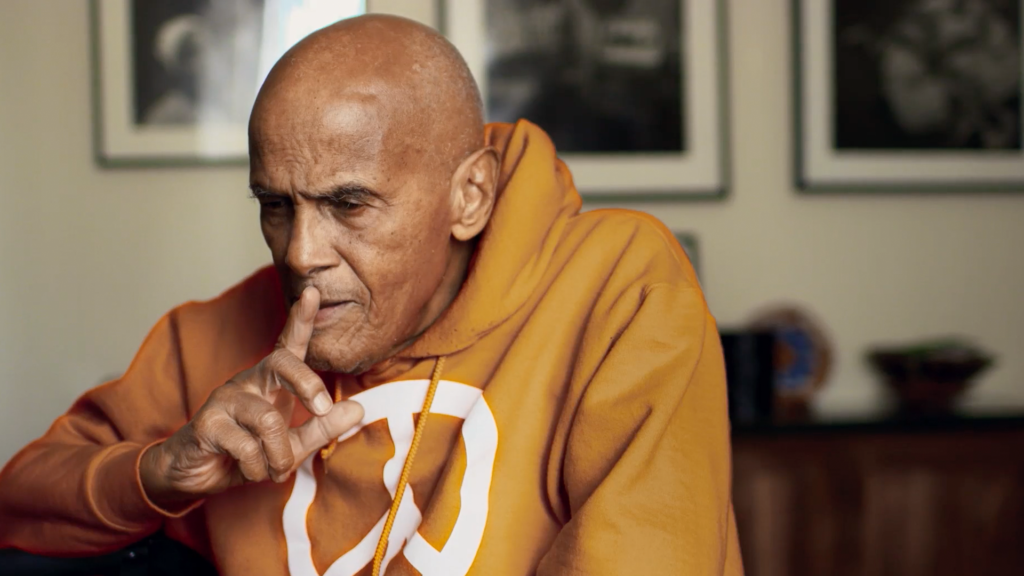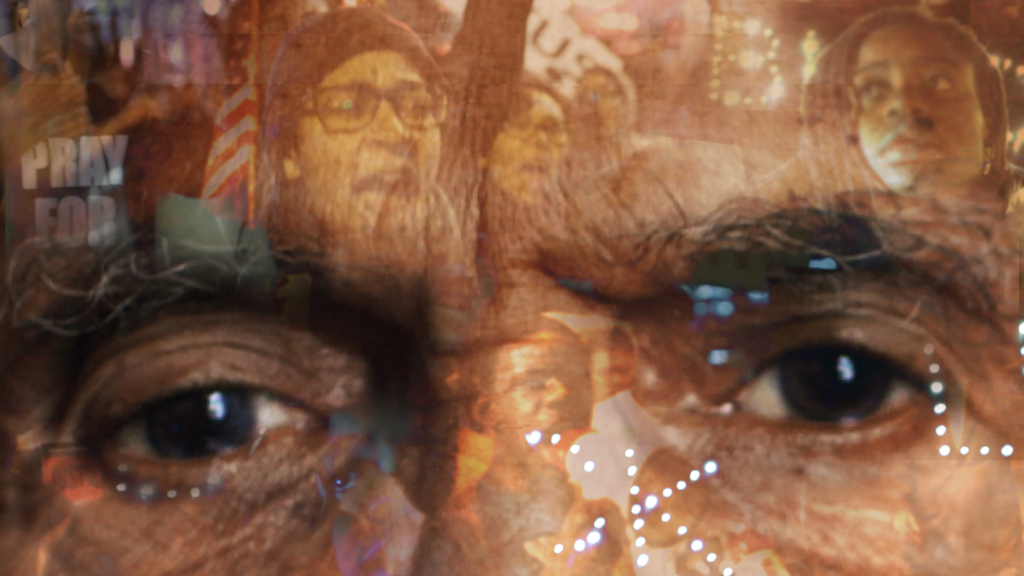Aja Monet, Aloe Blacc, Carmen Perez, Chuck D, documentaries, film festivals, Following Harry, Gina Belafonte, Harry Belafonte, Jamie Foxx, Jesse Williams, Kerry Kennedy, movies, Phillip Agnew, Purvi Shah, reviews, Rodrigo Venegas, Rosario Dawson, Sean Pica, Steven Padgett, Susanne Rostock, Talib Kweli, Tribeca Festival, Tribeca Film Festival
June 19, 2024
by Carla Hay

Directed by Susanne Rostock
Culture Representation: The documentary film “Following Harry” (which was filmed from 2011 to 2023) features a racially diverse group of people (African American, Latin, white) who are connected in some way to award-winning entertainer/activist Harry Belafonte, who participated in this documentary before he died in 2023, at the age of 96.
Culture Clash: Belafonte, who was part of the U.S. civil rights movement in the 1960s, mentored new generations of activists, who continue to battle social injustices such as racism and sexism.
Culture Audience: “Following Harry” will appeal primarily to people who are fans of Belafonte and documentaries about politically progressive activists.

“Following Harry” is a compelling chronicle of the last decade of the life of Harry Belafonte and his dedication to mentoring younger generations of activists. This documentary is occasionally unfocused, but Belafonte’s goals and legacy remain very clear. Belafonte died in 2023, at the age of 96. “Following Harry” had its world premiere at the 2024 Tribeca Festival.
Directed by Susanne Rostock, “Following Harry” could be considered a sequel to Rostock’s 2011 documentary “Sing Your Song,” which was about Belafonte retiring from performing and putting most of his energy into social activism. “Sing Your Song” also screened at the 2011 Tribeca Film Festival after having its world premiere at the 2011 Sundance Film Festival. Filmed from 2011 to 2023, “Following Harry” is an apt title, because it’s essentially a compilation of footage that follows Belafonte, in order to chronicle the activist causes he was involved with the most in the last decade of his life. The title could also refer to the activists who are following in Belafonte’s footsteps.
The documentary is a mix of exclusive behind-the-scenes footage, archival footage from other sources, and sit-down interviews with several people, including Belafonte. After one of the screenings of “Following Harry” at the Tribeca Festival, director Rostock said that Belafonte was blind in the last year of his life. Most of “Following Harry’s” sit-down interview footage of Belafonte was filmed in 2015, Rostock said.
“Following Harry” begins with a voiceover of Belafonte saying, “I’m wrestling right now with how to look back on my life. The question is: ‘Was it all wasted?’ All my life, the issue of race has been a part of my thinking … The truth of the matter is the enemy doesn’t sleep.”
Some of the documentary has a rambling and meandering tone where events are not shown in chronological order. However, “Following Harry” essentially gives focus to how Belafonte was affected by and reacted to four major events that sparked shifts in progressive social activism: The 2012 killing of unarmed Trayvon Martin by a self-apponted neghborhood watchdog in Sanford, Florida; the 2017 Women’s March in Washington, D.C.; the 2018 March for Our Lives event, a worldwide protest against gun violence; and the 2020 police murder of unarmed George Floyd in Minneapolis.
Martin’s death inspired the formation of the Black Lives Matter movement, which gained even more support in subsequent years as more tragic cases of unarmed black people being unjustly killed in the U.S. and other countries began to get high-profile, worldwide attention. As seen in the documentary, Belafonte (who believed in the Martin Luther King Jr. policy of non-violent activism) was frequently called on by people to advise and/or help plan many of the protests that resulted from these social causes.
Belafonte was also heavily involved in prison reform programs. A segment in “Following Harry” shows how Belafonte was a frequent visitor at Sing Sing prison (in Ossining, New York), which has a program for inmates to have a singing group. Belafonte was also involved in the Freedom Writer’s Song Lab, a songwriting workshop for young people who have shown an interest in social change.
Carmen Perez, one of the co-founders of the original Women’s March, is shown in the documentary as someone who worked closely with Belafonte for several years. The 2017 Women’s March was largely motivated as a protest against the election of Donald Trump to president of the United States. In behind-the-scenes footage, Perez told Belafonte in a Women’s March organizer meeting that many women involved in the Women’s March said they didn’t want the event to turn into a protest against Trump. However, Belafonte said that the anti-Trump protests should not only be addressed during the Women’s March but this anti-Trump message was also necessary because Belafonte said that Trump stood for the dismantling of women’s rights.
Some of the other people featured in the documentary include various activists, including Rosario Dawson, Jamie Foxx, Chuck D, Kerry Kennedy, Talib Kweli, Jesse Williams, Rodrigo Venegas, Aloe Blacc, Gina Belafonte (one of Harry’s daughters), Sean Pica, Steven Padgett, Phillip Agnew, Purvi Shah and Aja Monet. Harry Belafonte says in the documentary: “The absence of a career in the performing arts has been a huge adjustment for me.” However, viewers of “Following Harry” can see footage of him singing “Stir It Up” after he retired from performing. Harry Belafonte will always be remembered for his groundbreaking contributions to entertainment, but “Following Harry” is a testament to his important and powerful legacy in making societal changes for the better.
